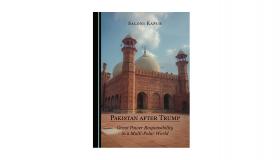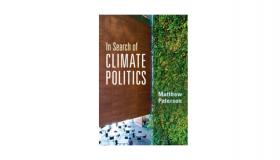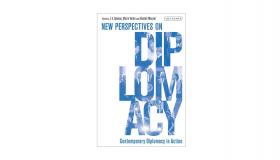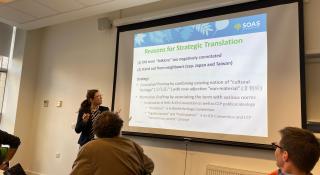
Breadcrumbs navigation
The latest in IR - autumn book round up
Welcome to our quarterly book round up. Each quarter we bring you updates on the latest International Studies releases by BISA members. To be included in the next update contact Communications Manager, Chrissie Duxson: Chrissie.Duxson@bisa.ac.uk
Pakistan after Trump
Great Power Responsibility in the Multi-Polar World
Saloni Kapur

Blurb
Since 9/11, the international narrative on Pakistan has painted a picture of a country that is a “safe haven” for terrorists, a “state sponsor of terrorism” that plays a “double game” as it pretends to fight militant Islamist extremists while nurturing them in its “backyard.” This discourse came to prominence in January 2018 when US President Donald Trump famously tweeted that his country had “foolishly” provided military aid to Pakistan since 2001, in return for which Pakistan had given “safe haven to the terrorists we hunt in Afghanistan.” Pakistan after Trump questions this dominant narrative by showing how the great powers—the United States, the United Kingdom, China, India, Saudi Arabia, and Iran—have directly caused the emergence of a militant ecosystem in Pakistan.
Drawing on interviews with journalists, diplomats, academics, military officers, and government officials, Saloni Kapur argues that it is Pakistanis who have borne the brunt of terrorist violence, especially since 9/11. The book uses the English School of international relations’ concept of great-power responsibility to explore how powerful states could help fight militancy in Pakistan holistically. Kapur highlights the Pakistani military’s effort to rehabilitate young militants and posits that international society must support not only “hard” counterterrorism through military aid, but also “soft” counterterrorism such as rehabilitation to address the root causes of radicalisation. With the Trump administration’s suspension of military aid to Pakistan, this timely book offers guidance for policymakers in the West and Asia on how best to approach Pakistan’s security quagmire.
BISA members can get a 25% discount on the book if they purchase directly from Cambridge Scholars using the code: PROMO25
The Molecularisation of Security
Medical Countermeasures, Stockpiling and the Governance of Biological Threats
Christopher Long

Christopher Long is currently a Leverhulme Early Career Fellow at the University of Sussex, UK. This book is part of the Routledge New Security Studies Series.
Blurb
This book investigates the way that the molecular sciences are shaping contemporary security practices in relation to the governance of biological threats.
In response to biological threats, such as pandemics and bioterrorism, governments around the world have developed a range of new security technologies, called medical countermeasures, to protect their populations. This book argues that the molecular sciences’ influence has been so great that security practices have been molecularised. Focusing on the actions of international organisations and governments in the past two decades, this book identifies two contrasting conceptions of the nature or inherent workings of molecular life as driving this turn. On the one hand, political notions of insecurity have been shaped by the contingent or random nature of molecular life. On the other, the identification of molecular life’s constant biological dynamics supports and makes possible the development and stockpiling of effective medical countermeasures. This study is one of the few to take seriously the conceptual implications that the detailed empirical workings of biotechnology have on security practices today.
This book will be of much interest to students of security studies, bio-politics, life sciences, global governance, and International Relations in general.
BISA members can get a 20% discount if they purchase the book directly from the Routledge website using the code: FLY21
In Search of Climate Politics
Matthew Paterson

Matthew Paterson is Professor of International Politics in the Department of Politics at the University of Manchester. He is also en editor for BISA journal Review of International Studies.
Blurb
In what ways is climate change political? This book addresses this key - but oddly neglected - question. It argues that in order to answer it we need to understand politics in a three-fold way: as a site of authoritative, public decision-making; as a question of power; and as a conflictual phenomenon. Recurring themes center on de- and re-politicization, and a tension between attempts to simplify climate change to a single problem and its intrinsic complexity. These dynamics are driven by processes of capital accumulation and their associated subjectivities. The book explores these arguments through an analysis of a specific city - Ottawa - which acts as a microcosm of these broader processes. It provides detailed analyses of conflicts over urban planning, transport, and attempts by city government and other institutions to address climate change. The book will be valuable for students and researches looking at the politics of climate change.
BISA members can get a 25% discount on the book (and all other CUP titles) if you purchase directly from Cambridge University Press using the code found in your joining or most recent renewal confirmation email.
Contemporary Diplomacy in Action
Alastair Masser (Anthology Editor), Jack Spence (Anthology Editor), Claire Yorke (Anthology Editor)

Dr Claire Yorke is a Henry A Kissinger Postdoctoral Fellow and Lecturer at International Security Studies and the Jackson Institute for Global Affairs at Yale University. In 2014, she was a member of the NATO and Atlantic Council Young Leaders Working Group, reporting to the NATO Secretary General. Prior to academia she worked at the Royal Institute of International Affairs and in the UK Parliament.
Blurb
Effective diplomacy remains fundamental to the conduct of international relations in the twenty-first century, as we seek to define and manage a challenging new world order peacefully.
New Perspectives on Diplomacy highlights the importance of diplomacy in political and military crises, featuring details of life as a diplomat, the importance of alliance building, managing failure and diplomatic negotiations with armed groups. Using regional case studies from Africa, Europe, the Middle East, Russia and Asia, the second volume demonstrates that the importance of diplomacy and diplomats remains undiminished.
You can purchase the book on the Bloomsbury website.
If you're a BISA member and you'd like your book included in next quarter's round up, email Communications Manager, Chrissie Duxson: Chrissie.Duxson@bisa.ac.uk. Please include the title, blurb and a link to where the book can be purchased. If you are able, you can also include details of any discount available, but of course this is not required. The book should have been published a maximum of six months prior to your email.
Top photo by Phil Hearing on Unsplash


